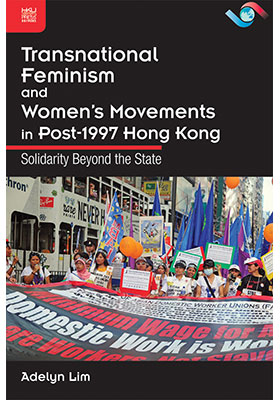Transnational Feminism and Women’s Movements in Post-1997 Hong Kong
Solidarity Beyond the State
(九七後香港的跨國女性主義與婦女運動)
ISBN : 978-988-8139-37-8
June 2015
168 pages, 6″ x 9″, 2 b&w illus.
- HK$265.00
Ebooks
This study demonstrates that recognizing the differences of the women activists promoting disparate agendas leads to a fuller appreciation of the connections and commonalities in the relations among those involved. Transnational Feminism and Women’s Movements in Post-1997 Hong Kong: Solidarity Beyond the State is the first comprehensive account of feminism and women’s movements in Hong Kong. The unique geographical, historical and cultural situation of the city provides the backdrop for Adelyn Lim to bring diverse groups of activists organizing socially disadvantaged and disaffected women, many of whom originating from Mainland China or South and Southeast Asia, to the foreground. Feminism, Lim argues, is not premised on a collective identity; it should rather be understood as a collective frame of action.
The book begins with a critical history of women’s mobilization during the British colonial period and the lead up to governance under the People’s Republic of China. Subsequent chapters discuss the organizational forms, rhetoric, and strategies of women’s groups in addressing the feminization of poverty, engagement with state institutions, violence against women, prostitution, and domestic work. Conflicts between feminist ideals and the realities and demands of the sociopolitical environment are thrown into sharp relief. The empirical analysis makes a case for Hong Kong to be considered a prime site to challenge and renew the theorizing of transnational feminism.
“In this well written monograph, Adelyn Lim explores the multiple forms of women’s activism in the tense political environment of post-1997 Hong Kong. Using feminist theory and social movement scholarship, she explores processes of framing social action and building coalitions in a context where unresolved conflicts abound. The result is a rich portrait of activism in one of the world’s most globalized cities.” —Andrew Kipnis, author of China and Postsocialist Anthropology: Theorizing Power and Society after Communism
“A book about Hong Kong feminisms that manages to be both sweeping and intimate, with through-lines of historical and political context seamlessly interwoven with details of activist identities and commitments. Lim skillfully connects feminist and social movement theory with movement praxis to develop a compelling account of local feminist organizing situated in a clear transnational context. ” —Sharon Wesoky, author of Chinese Feminism Faces Globalization




